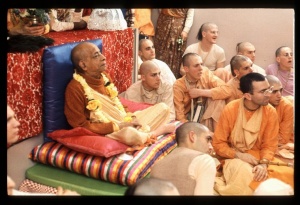SB 4.19.23

A.C. Bhaktivedanta Swami Prabhupada
TEXT 23
- yāni rūpāṇi jagṛhe
- indro haya-jihīrṣayā
- tāni pāpasya khaṇḍāni
- liṅgaṁ khaṇḍam ihocyate
SYNONYMS
yāni — all those which; rūpāṇi — forms; jagṛhe — accepted; indraḥ — the King of heaven; haya — the horse; jihīrṣayā — with a desire to steal; tāni — all those; pāpasya — of sinful activities; khaṇḍāni — signs; liṅgam — the symbol; khaṇḍam — the word khaṇḍa; iha — here; ucyate — is said.
TRANSLATION
Whatever different forms Indra assumed as a mendicant because of his desire to seize the horse were symbols of atheistic philosophy.
PURPORT
According to Vedic civilization, sannyāsa is one of the essential items in the program of the varṇa-āśrama institution. One should accept sannyāsa according to the paramparā system of the ācāryas. At the present moment, however, many so-called sannyāsīs or mendicants have no understanding of God consciousness. Such sannyāsa was introduced by Indra because of his jealousy of Mahārāja Pṛthu, and what he introduced is again appearing in the age of Kali. practically none of the sannyāsīs in this age are bona fide. No one can introduce any new system into the Vedic way of life; if one does so out of malice, he is to be known as a pāṣaṇḍī, or atheist. In the Vaiṣṇava Tantra it is said:
- yas tu nārāyaṇaṁ devaṁ
- brahma-rudrādi-daivataiḥ
- samatvenaiva vīkṣeta
- sa pāṣaṇḍī bhaved dhruvam
- (CC Madhya 18.116)
Although it is forbidden, there are many pāṣaṇḍīs who coin terms like daridra-nārāyaṇa and svāmi-nārāyaṇa, although not even such demigods as Brahmā and Śiva can be equal to Nārāyaṇa.